It is a letter of authorization that grants someone else the authority to act as a representative and manage the sale of property on the owner’s behalf. The person granting this authority is referred to as the principal, while the appointed party is known as the agent or representative.
The agent is appointed to perform specified functions such as preparing contracts, negotiating on the property owner’s behalf, conducting a sale, and receiving documents. This authorization is typically given when the property owner is unavailable due to other commitments, a different location, or wants to entrust the sale to a qualified professional, such as a real estate agent.
This article will go over exactly what an authority to sell entails, its limitations, and the various types of such letters that exist.
Involved Parties
There are usually three parties involved during the drafting of it and the selling process as a whole:
- The first party is the property owner, who is looking to sell. In other words, they are the homeowners.
- The second party is the potential buyer of that piece of real estate. Therefore, the contract is addressed explicitly to this party in general.
- The third party is the agent or broker who acts on behalf of the property owner when they are not present.
Types of Authority to Sell
There are primarily two categories of selling authority. First, there is exclusive authority, and second, there is non-exclusive authority. Both have pros and cons, and the choice of one or the other is often up to the seller or the real estate agency’s policy.
Here is an account of these types and their respective pros and cons:
Exclusive authority is given to one specific agency or its firm. This means that they are the only entity with the legal right to represent and market the property on the owner’s behalf. This is the most common type of authority to sell and is beneficial for both the seller and the broker.
Pros
From the seller’s perspective, it can be advantageous only to need to communicate with one agent during the marketing and selling procedure. This means that the seller only needs to communicate with one person, who handles everything else on their behalf.
The main positive point of the broker’s perspective is that they are guaranteed a commission if the property is sold. The exclusive authority contract typically awards the broker a commission even if the seller finds a potential buyer without consulting the real estate agent.
Exclusive authority letters to sell typically have a specified timeframe for their validity. The broker will remain committed and focused on selling a property quickly. Therefore the sale will likely proceed quickly, benefitting both the real estate agent and the seller. If a property does not sell before the specified time limit, a seller has the right to renew with the same broker or try their luck with a different agent.
Cons
The primary disadvantage to an exclusive authority contract is if the real estate agent representing the owner does not have the required level of commitment to selling the property. In addition, as the owner is limited to one broker, they are restricted to the capabilities and effort put forward by them.
Non-exclusive authority
On the other hand, a non-exclusive authority allows multiple agents to market a property and represent a seller. This is often the choice for sellers who do not have a high urgency to sell a property.
Pros
The most important advantage of a non-exclusive authority to sell is working with multiple brokers simultaneously. This means that a seller is not restricted to working with one individual, and the marketing potential for the property is increased. In other words, more people representing a property means that a larger group of potential buyers will learn about it.
Cons
For the seller, the main disadvantage is the tediousness of needing to work with several brokers simultaneously. This results in a time commitment as they need to communicate and coordinate with several agents. Additionally, this can be problematic for the seller as the agents will not have a time limit on their property marketing. This means that the brokers will not act with the same sense of urgency, and the sale may not be a high priority for them.
In conclusion, choosing between an exclusive or non-exclusive authority to sell depends on the seller’s situation and urgency. An exclusive contract typically yields faster results, while a non-exclusive one offers the benefit of being able to wait for a better offer price.
note
A multiple listing clause is often found within the exclusive authority contract to sell. This clause will specify that the property can be marketed via other brokers involved in the multiple listing service. This may vary depending on the region, but a multiple listing service will generally specify the terms of this clause. In addition, it will determine how an agent must handle their listings and how the MLS will treat its members.
What to Include?
When drafting this letter to sell a property, several key elements must be included. These components are both legally required and beneficial to all parties involved.
Make sure to include these seven components when creating it:
Date of signing
As with most legal documents, it is important to specify when this letter is signed to establish the beginning of the period. Therefore, it is crucial to include the date in it.
Property details
In-depth information about the property should be included so that the broker understands the technical aspects of the property they are bound to sell. In addition, this ensures that the agent is appropriately marketing the piece of real estate so that the offer negotiation process goes smoothly.
Fee and tax responsibilities
The document should list which party is responsible for all fees and taxes applicable to selling a property. Be sure to include all fees and tax responsibilities in the letter.
For example, it’s essential to keep the following in mind:
EXAMPLE
- Notary fees
- Taxes to the Internal Revenue Service (IRS). This depends on the country but could be capital gains, withholding tax, value-added tax, etc.
- Local government fees
- Title registration costs
Professional fee and agent commission rate
The agency or professional representing you may have a flat fee and a commission rate that should be established. The seller is fully aware of how much of the sale will go to their broker.
Expiration date
If this letter has an expiration date, that must be included. Some non-exclusive authorities do not have a specified expiry, but the details of that condition must also be included.
Hold-over clause
This clause protects brokers from sellers who attempt to sell the property without providing proper commission to the agent for their services. For example, the clause may specify that the broker has the right to a specific commission rate for six months after the expiration date. If this is the case, include this clause in the letter.
Seller signature
This is fundamental, as the seller gives another individual the right to market and sell their property, so a signature is required.
Format of an Authorization Letter to Sell Property
It is a formal document that demands appropriate formatting to enhance its professionalism, clarity, and legal validity. This prevents any potential miscommunications or misinterpretations.
Outlined below are the essential components of it:
Header
The header is the first component of the letter. It should indicate your name and address as the property owner, as well as the date when it was written. Subsequently, provide the name and address of the recipient who has requested or would need it to proceed with the property sale. This helps you establish the context and identify the parties involved in the authorization.
Salutation
Following the header, the document necessitates a formal and respectful salutation. The appropriate salutation depends on the recipient’s name and title. To specify the recipient’s name, you should use: “Dear [Recipient’s Name] ” or “Dear Mr./Mrs./Ms. [Last Name],” Typically, the letter will be addressed to a prospective buyer or third party involved in the transaction.
Introduction
Write an introduction that sets the tone for it and provides context behind granting authorization for the property’s sale. You should start this section with a subject line that clarifies its intent, such as “Letter of Authority to Sell a Property.” This should be followed by a statement specifying that you, the principal, categorically grant the named third party to represent you in the specific transaction.
Body
In this section, you should provide detailed information about the specific property, powers, responsibilities, and tasks you are delegating to the authorized agent. So, start by defining the property in question by specifying its address, legal description, and other identifying information. Then, define the scope of the authorization. The authority may extend to marketing and advertising, property showings, negotiations, contract execution, financial transactions, paperwork, and documentation.
Additionally, it’s crucial to outline limitations applicable to the authorization, such as validity duration, contingencies, and the right to revoke. The body section ensures that both you and the agent have a shared understanding of your respective roles within the property sale process.
Additional information
This segment should provide any additional information that is needed to complete or support the authorization process. You can use this section to convey instructions such as flexible and fixed terms, preferred selling prices, and communication channels. Also, use this section to mention anyenclosures,s such as property surveys, inspection reports, or recent appraisals you will share with the appointed representative to facilitate their tasks.
Closing
Lastly, conclude it courteously and professionally. You can end with a complimentary closing such as “Sincerely”, “Best Regards”, or “Respectfully”. After the complimentary closing, provide your name.
note
If the letter needs to be shared with other parties, include a “CC” section at the bottom. Then, list the names and contact information of the parties to receive copies of it.
Authority Letter to Sell Property Template
[Your Name]
[Your Address]
[City, State, Zip Code]
[Phone Number]
[Email Address]
[Date]
[Recipient’s Name]
[Recipient’s Title/Position if applicable]
[Recipient’s Address]
[City, State, Zip Code]
Subject: Authority to Sell Property on My Behalf
Dear [Recipient’s Name],
I, [Your Name], residing at [Your Address], hereby grant [Authorized Person’s Name], holding Identification Number [ID/Passport Number of Authorized Person], the full authority to act on my behalf in all matters concerning the sale of my property located at [Property Address]. This property is legally described as [Legal Description of Property], and is registered under my name as per the local government’s land and property registry.
This authorization includes, but is not limited to, the power to negotiate and finalize sales terms, sign contracts or agreements, receive payments, and execute all necessary legal documents required for the sale and transfer of ownership of the said property. [Authorized Person’s Name] is also empowered to interact with all relevant parties, including real estate agents, buyers, lawyers, and government officials, as necessary to facilitate and conclude the sale.
This letter serves as a legal document to confirm that [Authorized Person’s Name] has my full consent and authority to sell the property on my behalf. I assure that all actions taken by [Authorized Person’s Name] regarding this matter will be legally binding and recognized as if I were personally present and acting myself.
Please recognize and accept any documents signed and actions taken by [Authorized Person’s Name] as valid and legally binding under my authorization. This authority is granted from the date of [Start Date] and will remain in effect until [End Date/Until Revoked], unless otherwise revoked or terminated in writing by me.
Should you require any further confirmation or documentation regarding this authorization, please feel free to contact me directly at [Your Contact Information].
Thank you for your attention to this matter and your cooperation.
Sincerely,
[Your Signature]
[Your Name]
Sample Letter
Subject: Authority to Sell Property on My Behalf
Dear Mrs. Lawrence,
I, Jacob Harrison, currently residing at 235 Oak Lane, Columbus, OH, 43220, do hereby grant full authority to Ms. Angela Thompson, holding Identification Number AB1234567, to act on my behalf in all matters concerning the sale of my property located at 102 Maple Drive, Columbus, OH, 43212. This property is legally described as Lot 24, Maple Community Estates, and is registered under my name in the Franklin County property records.
This authorization permits Ms. Thompson to negotiate and finalize sales terms, sign contracts or agreements, receive payments, and execute all necessary legal documents required for the sale and transfer of ownership of the said property. Ms. Thompson is also empowered to interact with real estate agents, prospective buyers, legal representatives, and government officials as necessary to facilitate and conclude the sale.
This letter serves to confirm that Ms. Angela Thompson has my full consent and authority to sell the property on my behalf. All actions taken by Ms. Thompson in relation to the sale of this property shall be considered legally binding and as having been performed with my full consent and knowledge.
Please recognize any documents signed and actions taken by Ms. Thompson as valid and legally binding under my authorization. This authority is granted from the date of this letter and will remain in effect until the property is sold or until otherwise revoked or terminated in writing by me.
Should there be any need for further confirmation or if additional documentation is required regarding this authorization, please do not hesitate to contact me directly at the phone number or email address provided above.
I appreciate your cooperation in this matter and your assistance in facilitating the sale of my property.
Sincerely,
[Signature]
Jacob Harrison
Analysis
The letter effectively delegates authority to a designated individual to manage the sale of the sender’s property. It provides clear and comprehensive instructions regarding the scope of the representative’s powers, including negotiating terms, signing contracts, and interacting with relevant parties. By specifying the property’s legal description and location, along with the representative’s identification number, the letter ensures accurate identification and delineation of responsibilities. It also emphasizes the legally binding nature of the representative’s actions, instilling confidence in potential buyers and other involved parties. The letter’s explicit mention of the authorization’s duration, until the property is sold or formally revoked, establishes a clear timeline for the representative’s authority.
Overall, the letter is well-structured, concise, and legally sound, serving as a crucial document for facilitating the property sale process. It demonstrates the sender’s understanding of the necessary formalities involved in authorizing a representative and reflects a proactive approach to managing the property sale efficiently and effectively.
Legal Considerations
Writing it involves important legal considerations to ensure that it is valid, enforceable, and protects the interests of all parties involved. This is because any errors or omissions could have legal implications.
Here are several legal considerations to keep in mind:
Local laws and regulations
Different jurisdictions have varying laws and regulations governing the sale of property and authorization letters. Be sure to do research and comply with local legal requirements. Taking the time to ensure that it is properly drafted and compliant with relevant laws is essential for a smooth and legally sound property sale process. Failure to do so renders it invalid and complicates the transaction.
Witness or notary
Depending on local legal requirements, you may need to have it witnessed by a third party or notarized to enhance its legal validity. A notary public verifies that you consented to transfer the specified authority. This limits the potential disputes regarding the authenticity of the representation.
Specificity and limitations of powers and responsibilities
Clearly outline the powers, responsibilities, and tasks you are delegating to the authorized agent. Use clear and unambiguous language to leave no room for misinterpretation or overlapping of roles. Also, specify any limitations imposed on the agent’s powers and responsibilities.
Samples and Templates
Many authorization letters to sell a property will follow a similar format and structure. Here is an example and a template that can easily be adjusted to match the needs of any real estate agent:
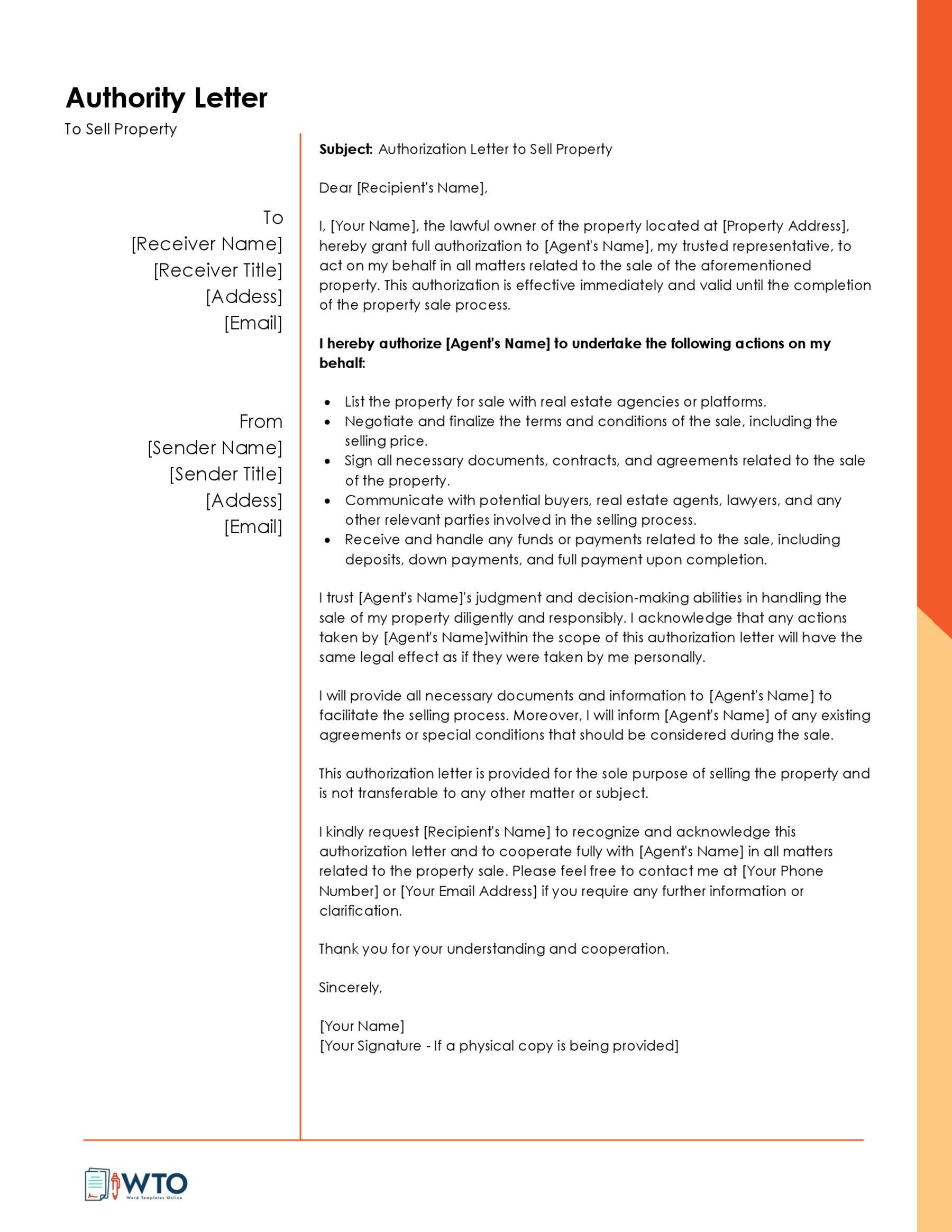
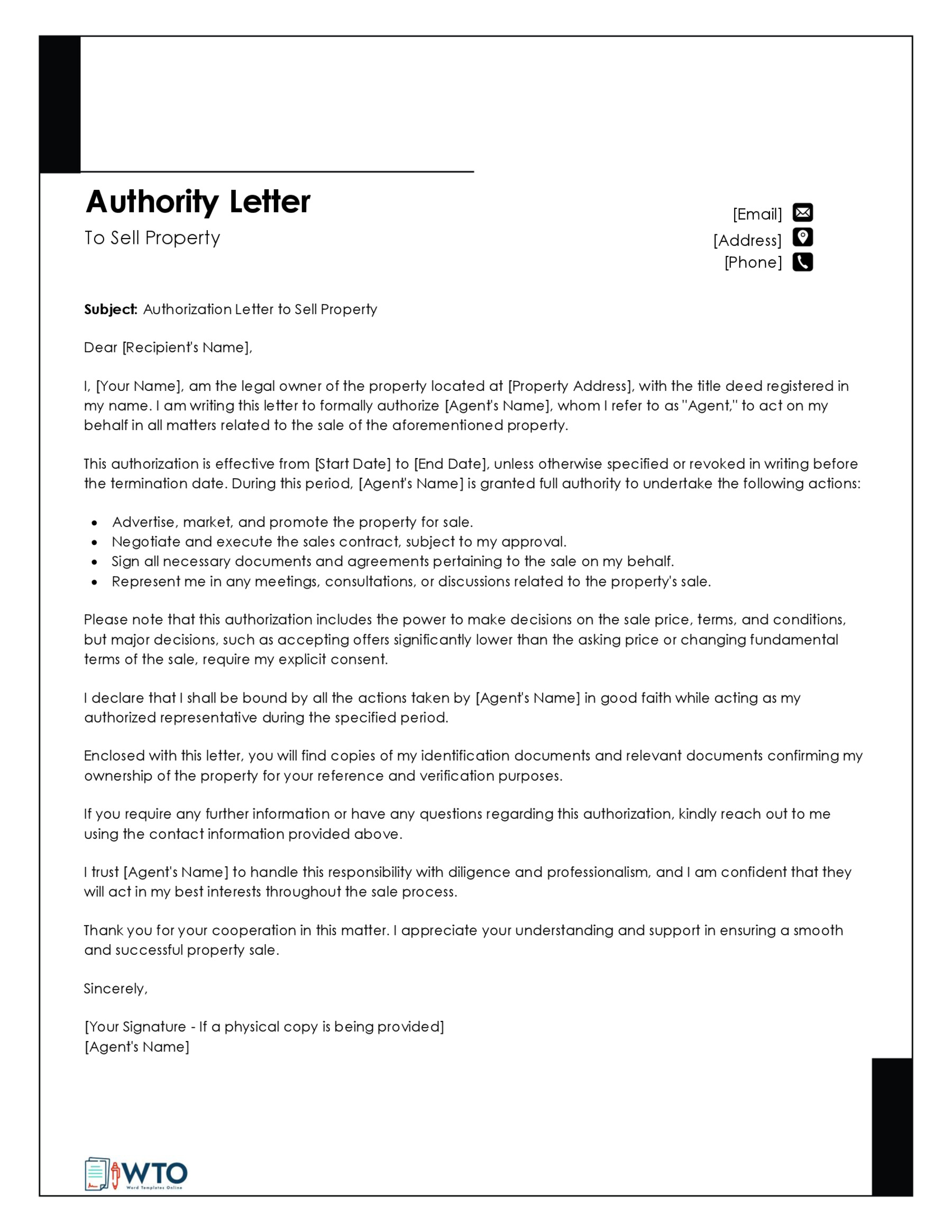
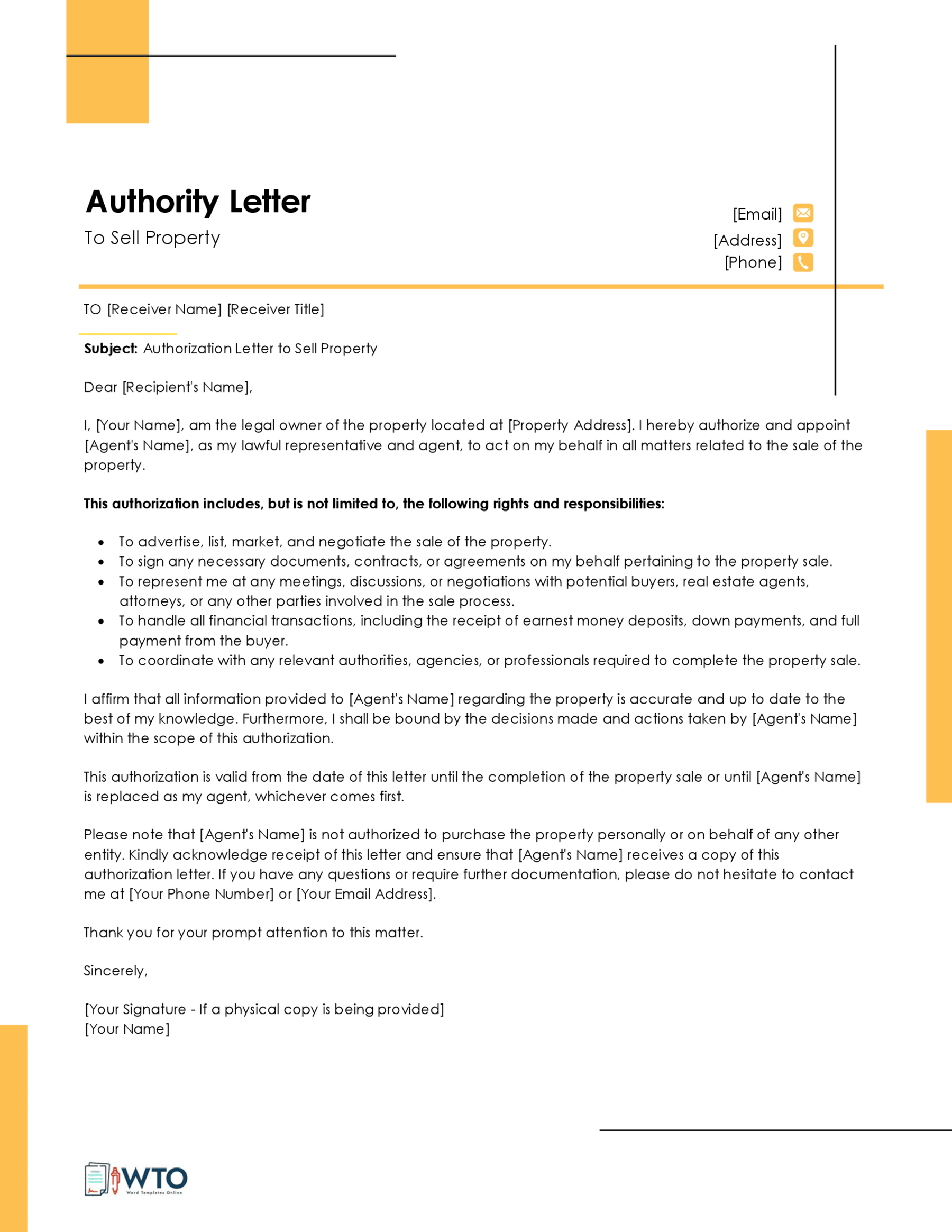
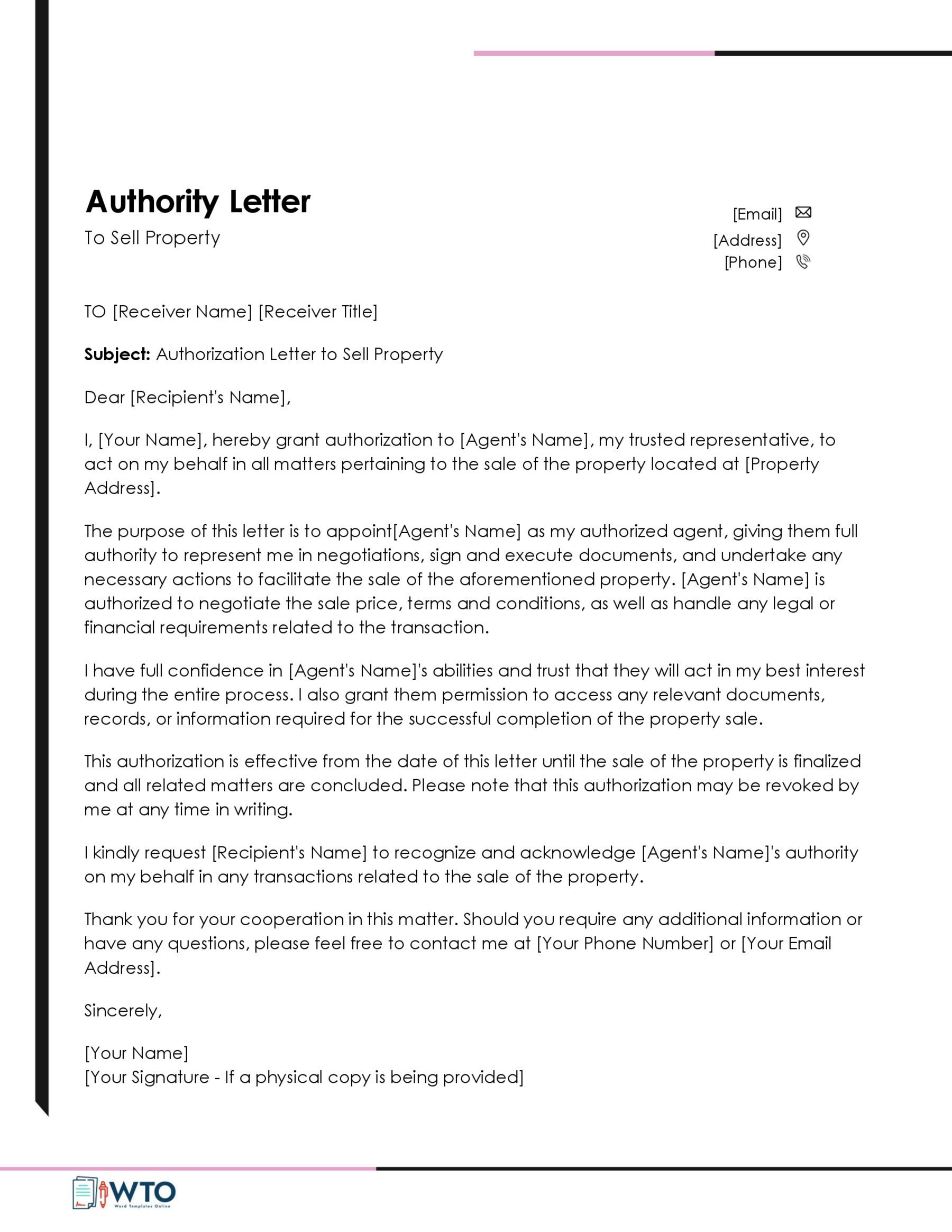
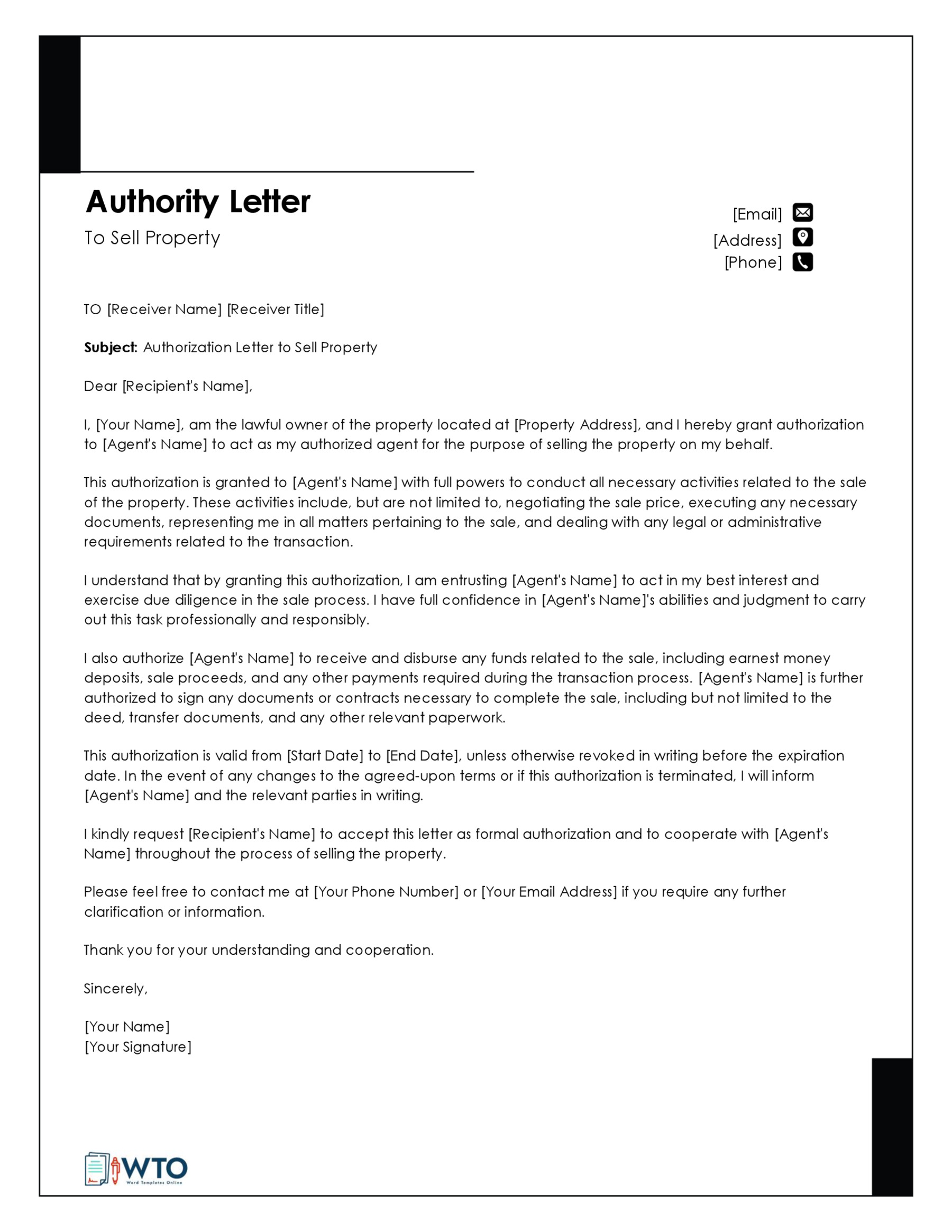
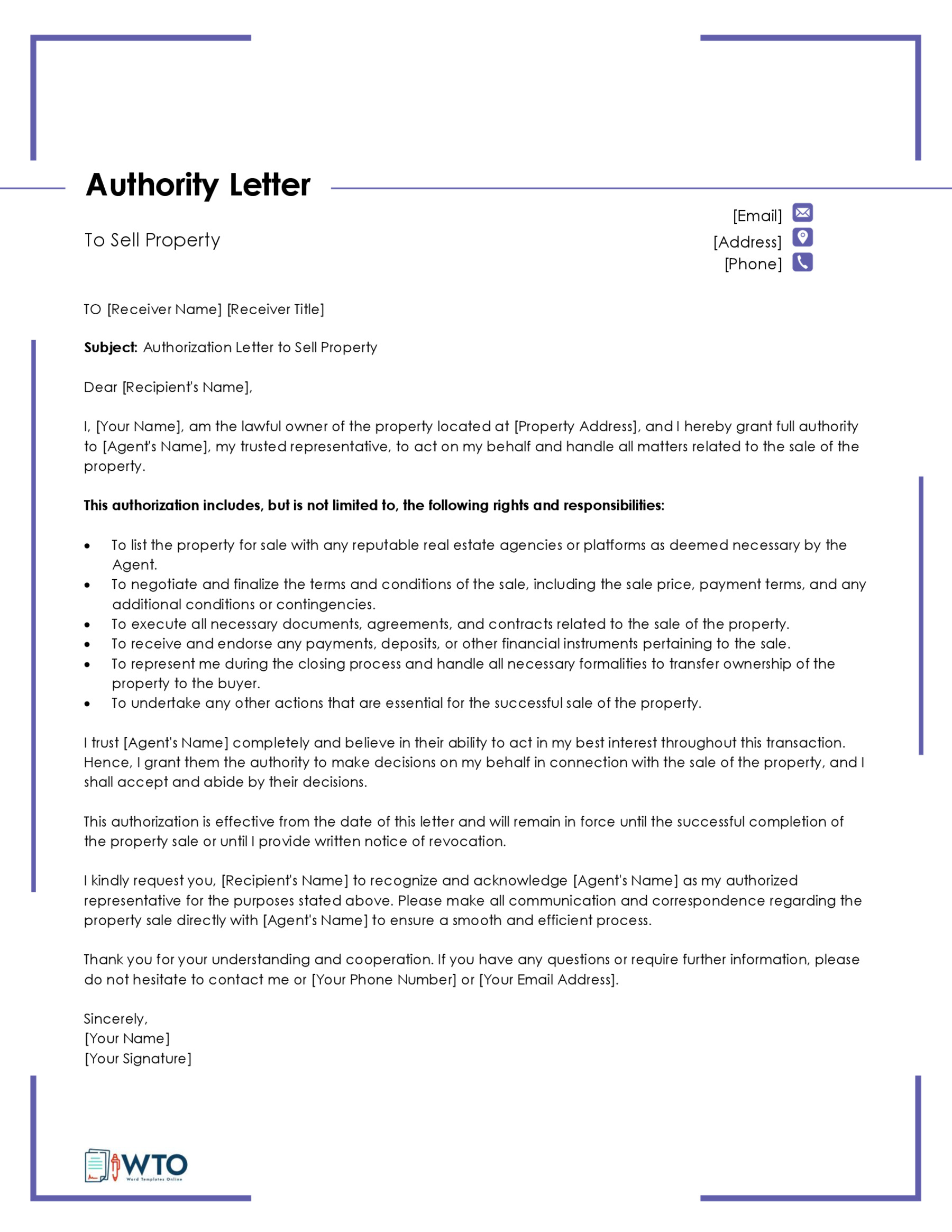
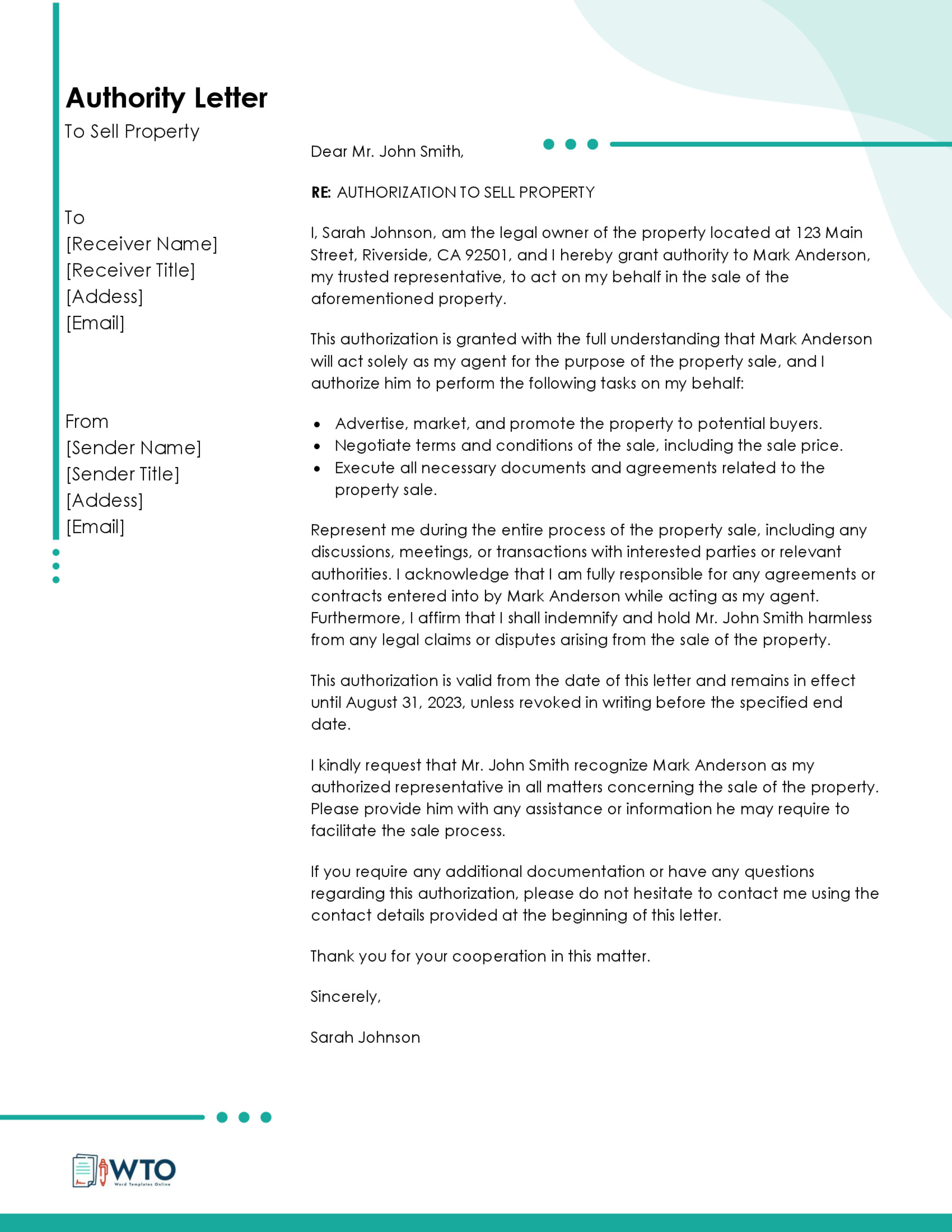
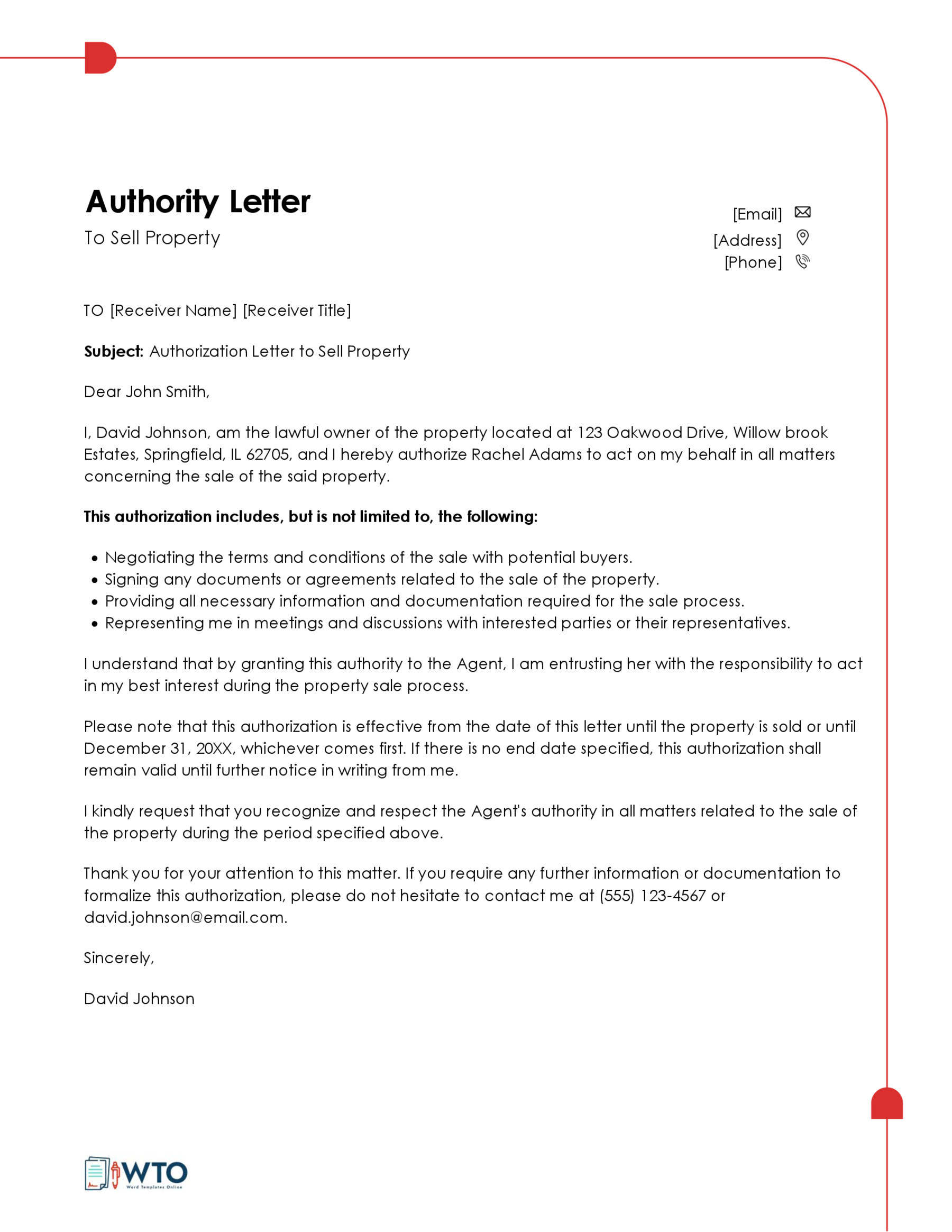
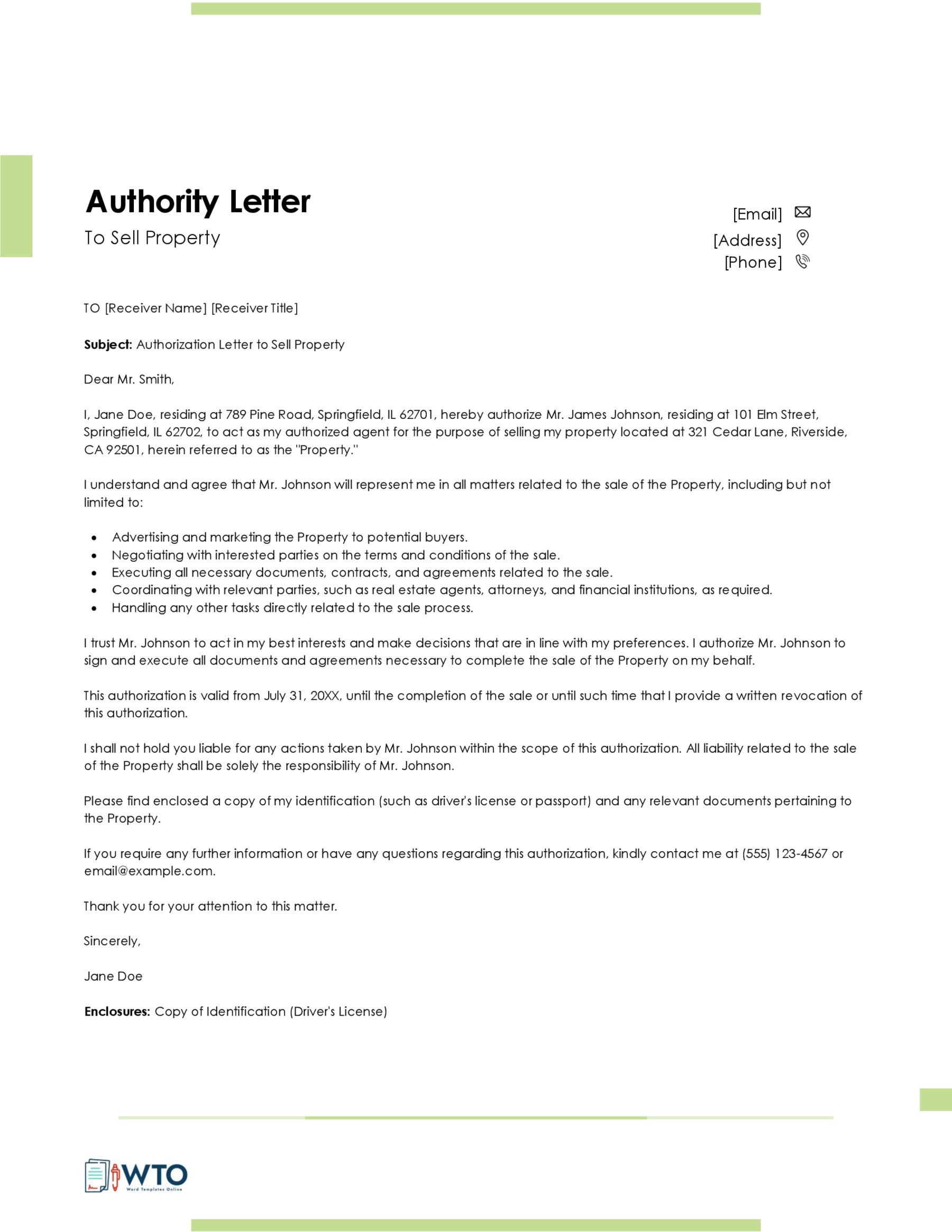
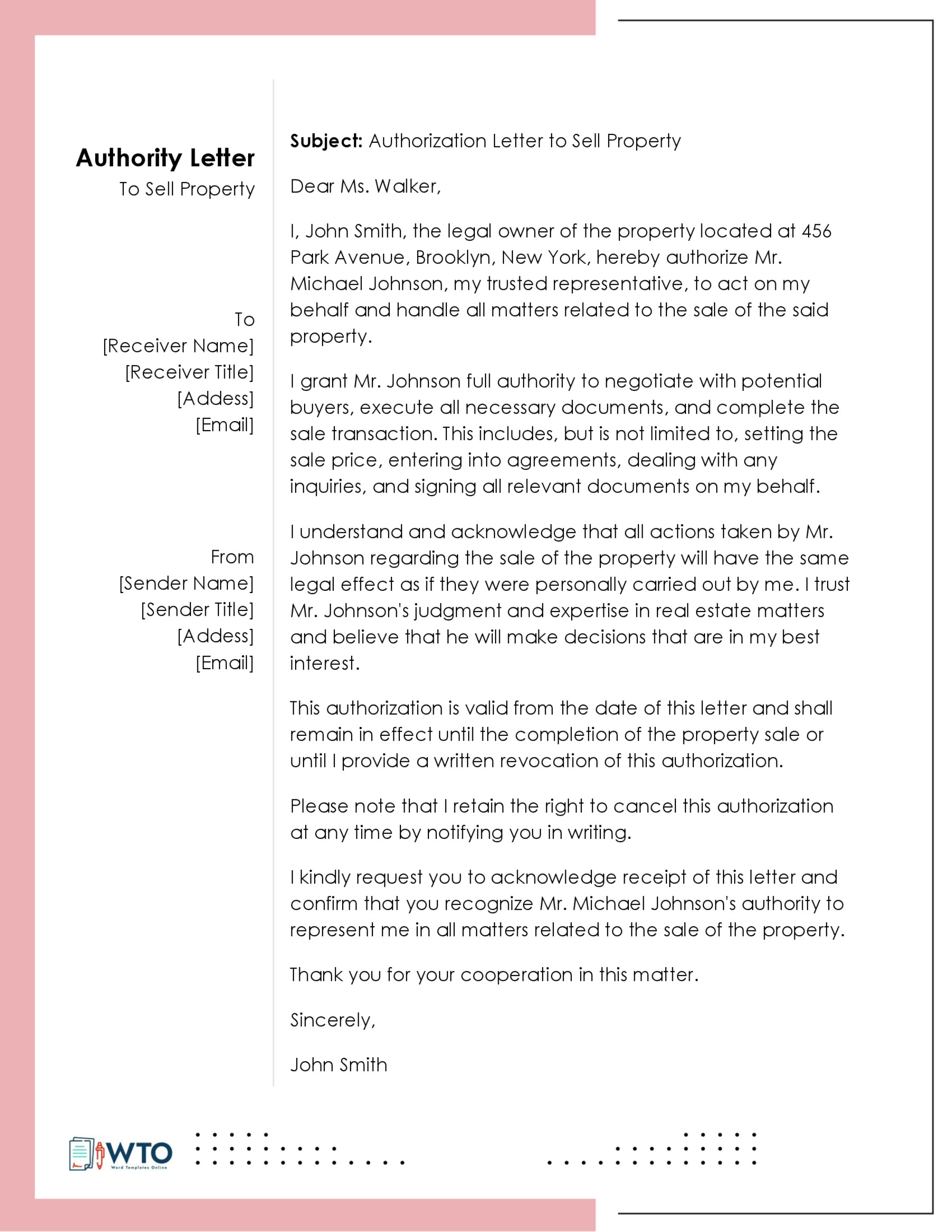
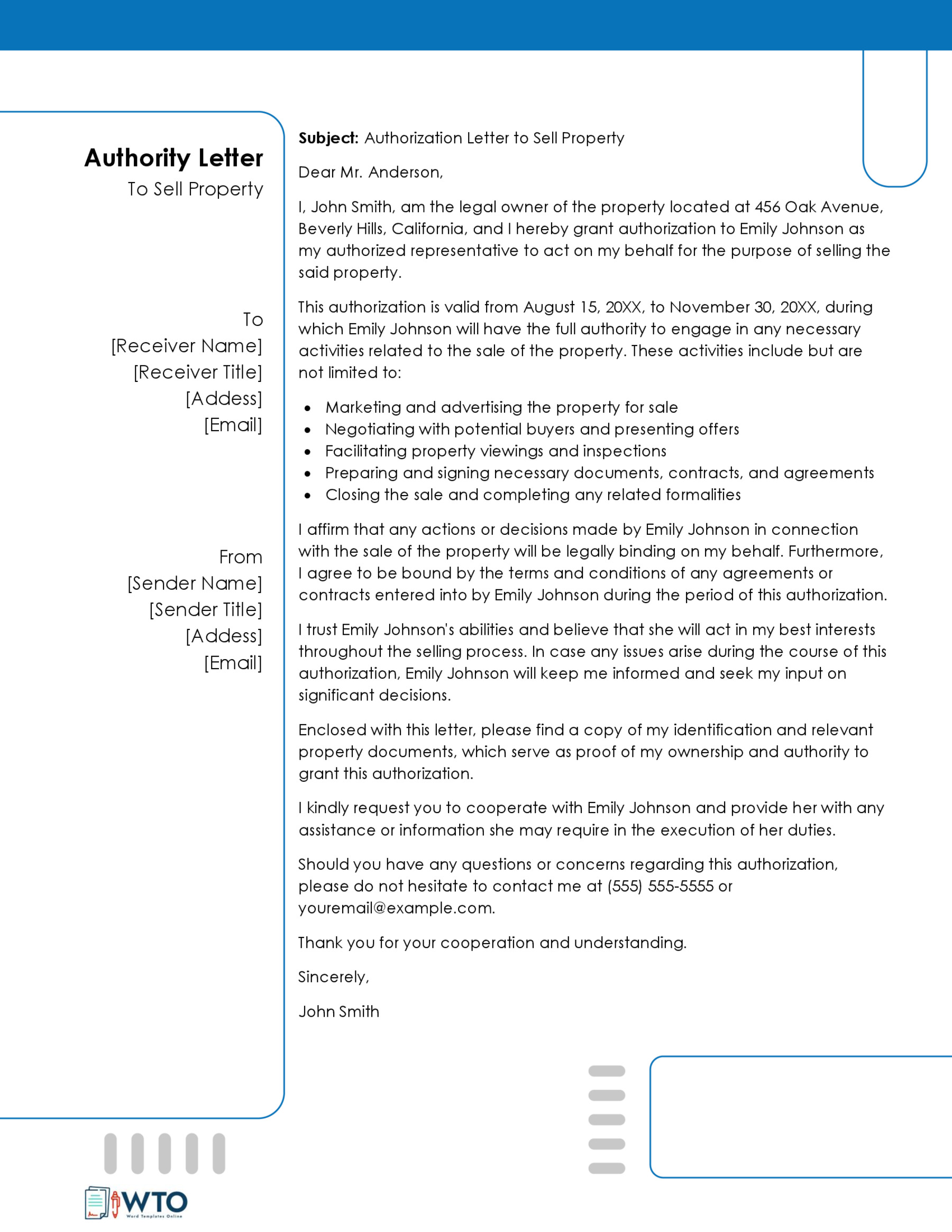
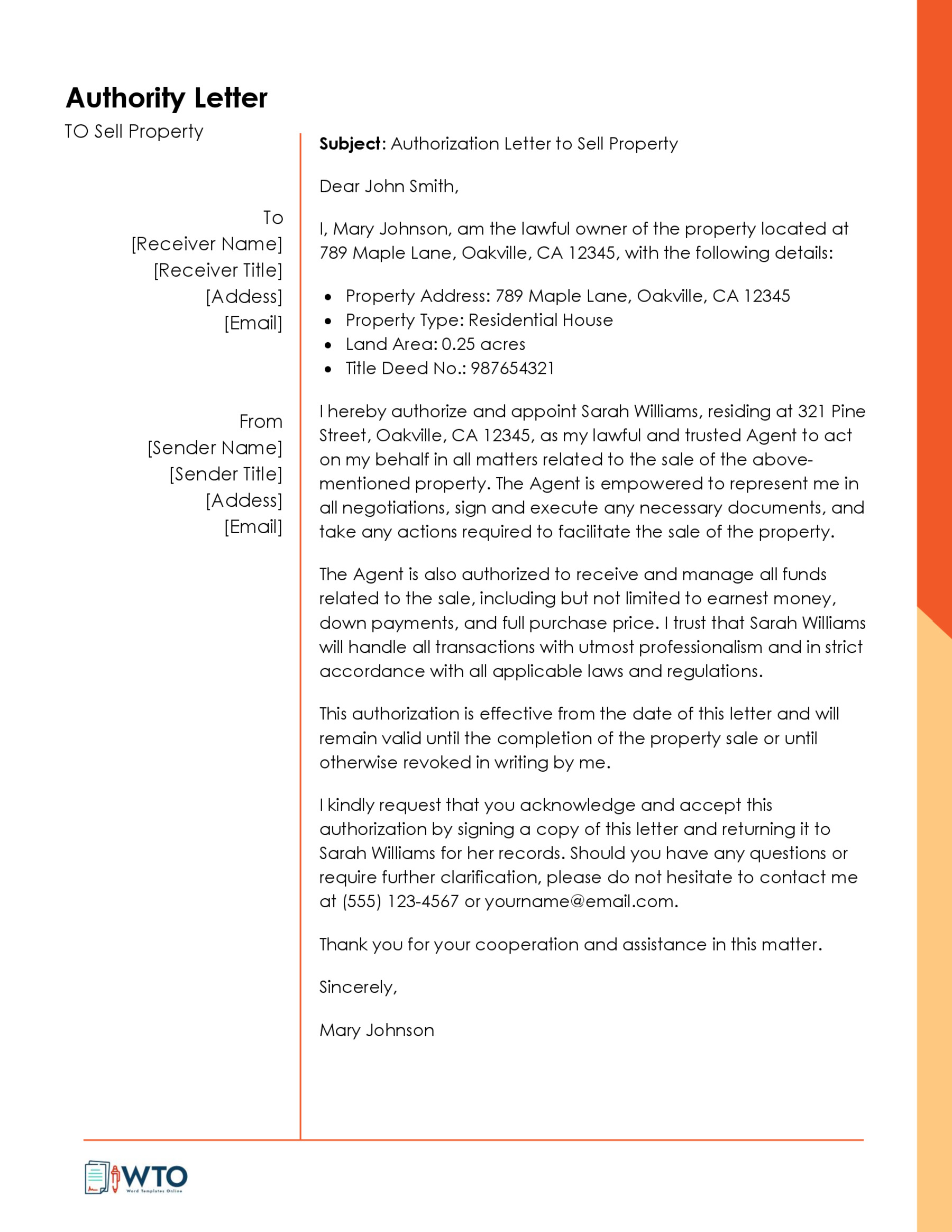
Free Templates
Given below are authorization letter templates:
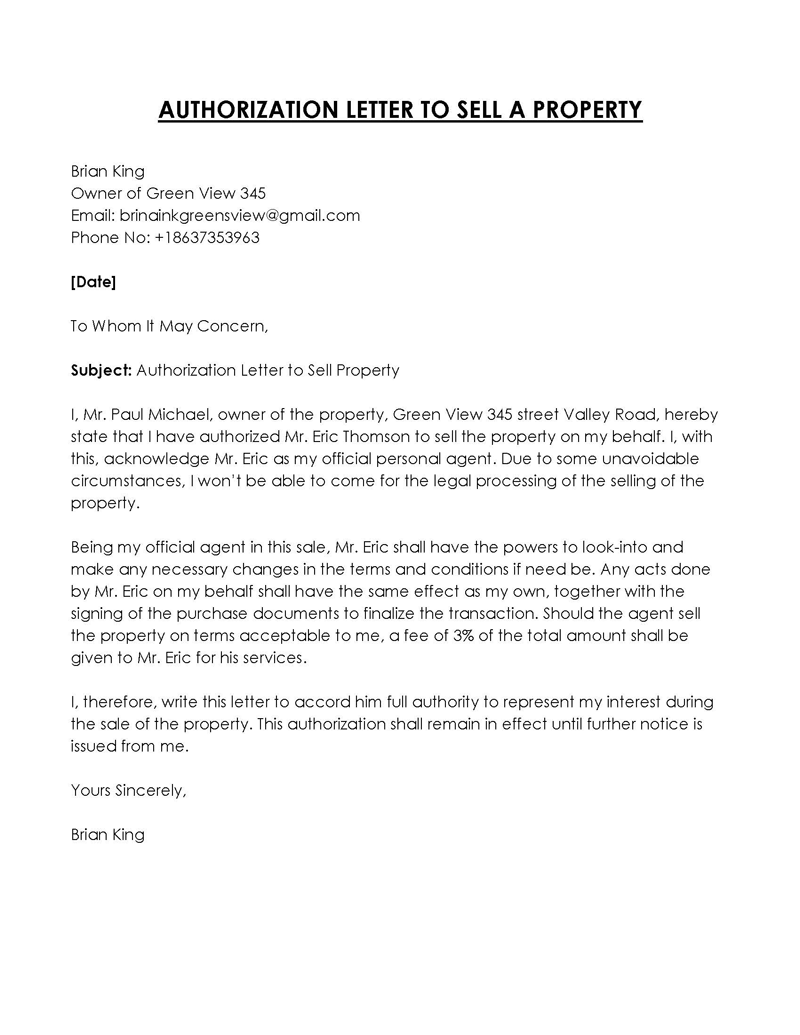
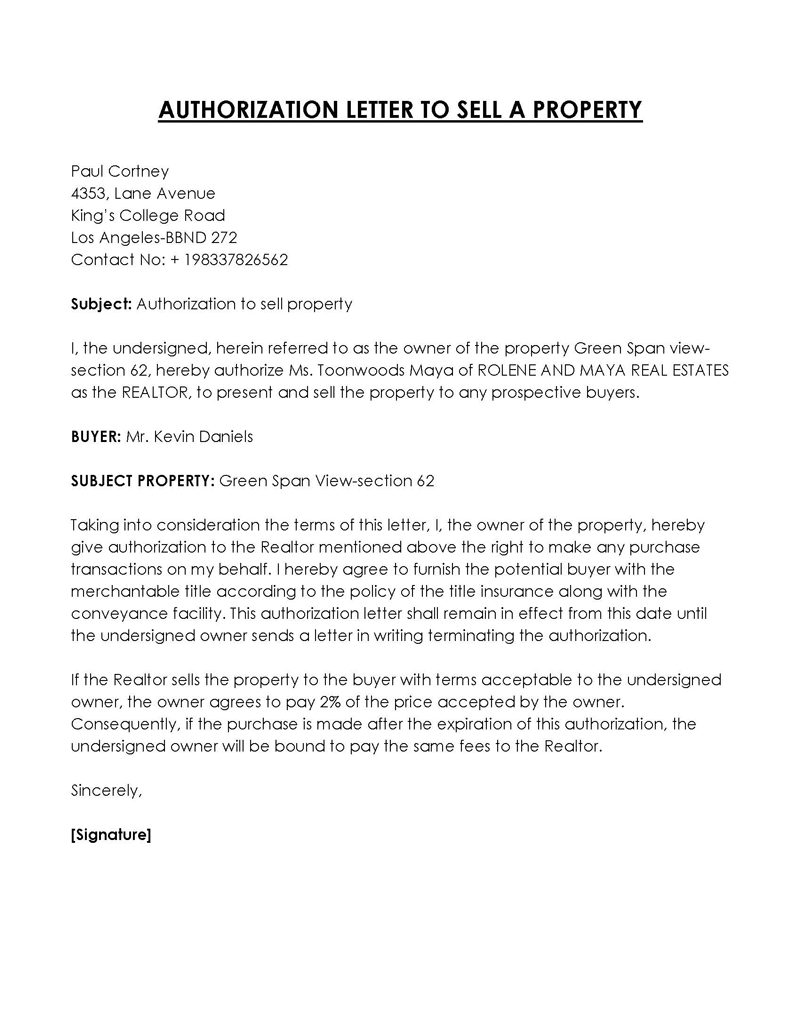
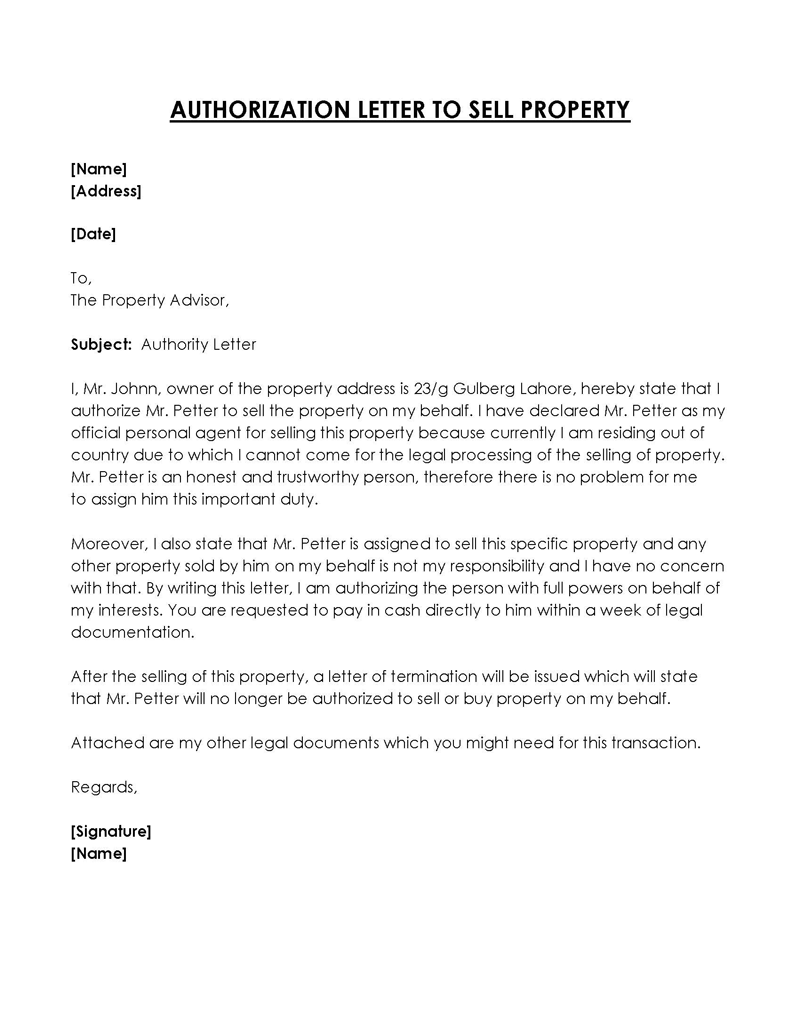
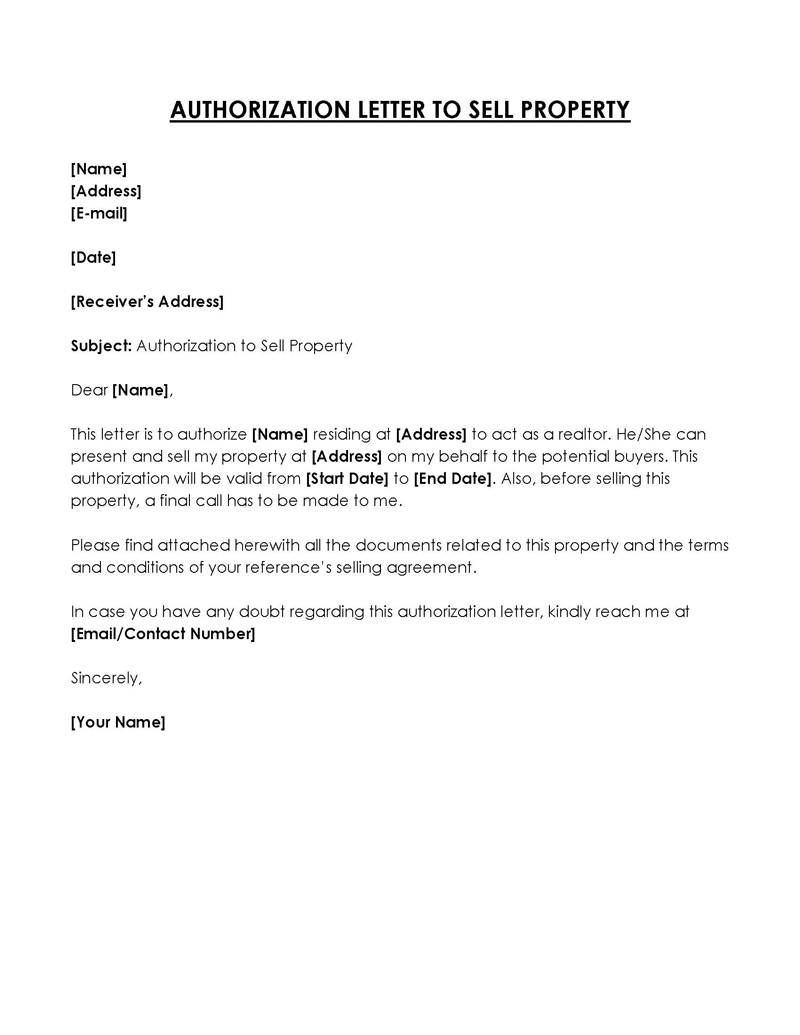
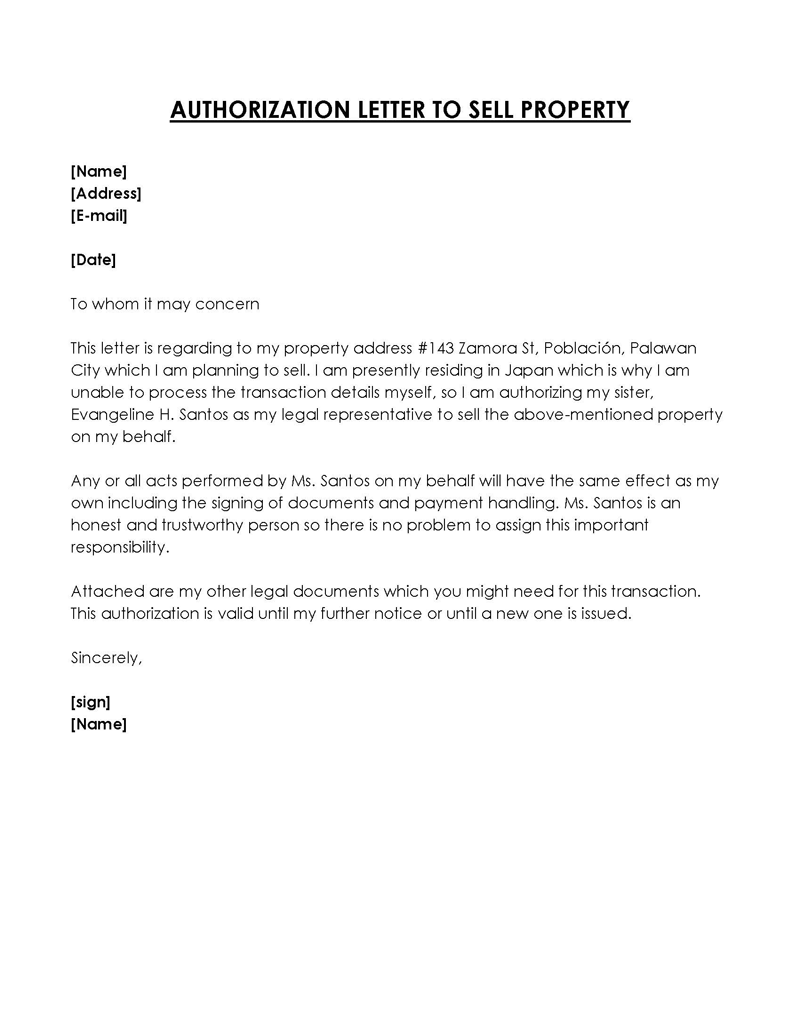
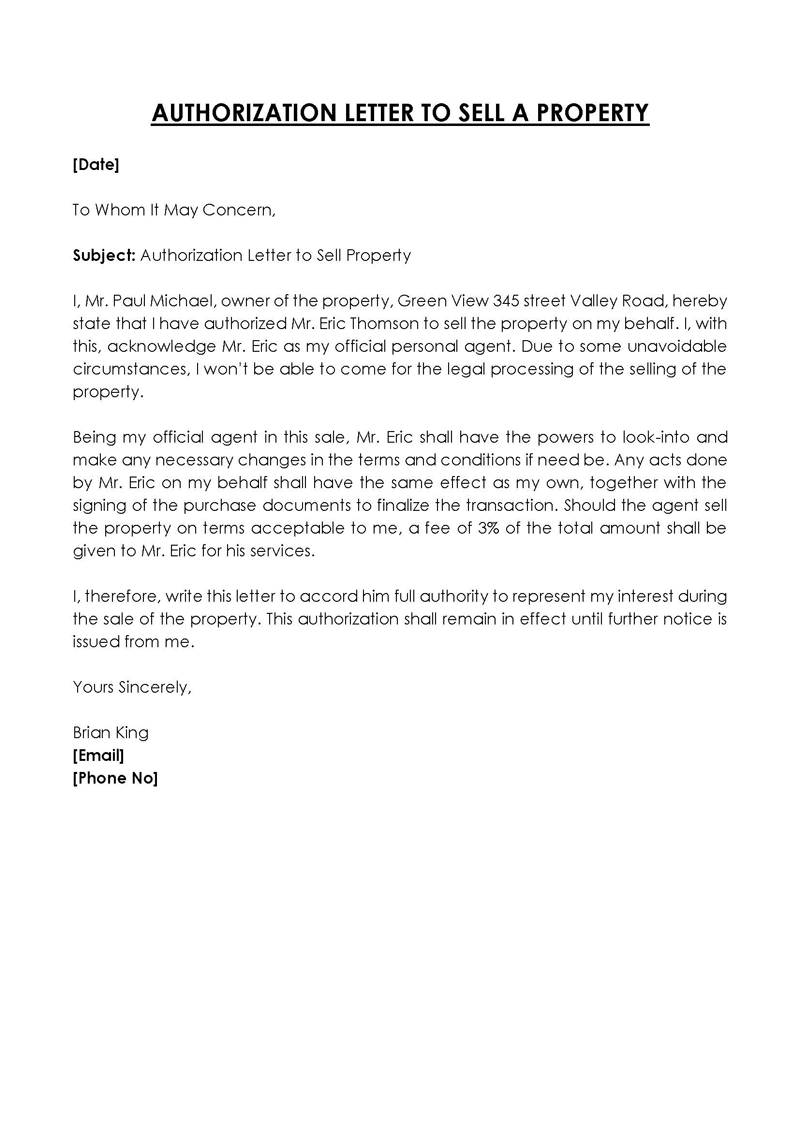
Conclusion
An authorization letter to sell a property is a crucial real estate document that ultimately protects the seller, broker, and buyer. In addition, it will lay out the selling process so that all parties are clear in terms of expectations and the results of the sale. The choice between an exclusive or non-exclusive authority to sell will depend on the seller’s needs.
In any case, the seller should carefully weigh the pros and cons of the different types of contractual possibilities available to them and decide what is right for them. Regardless of which authority is best for their case, it is always best to speak directly with the real estate agent and discuss sales expectations to make the process go smoothly.









